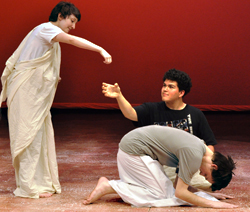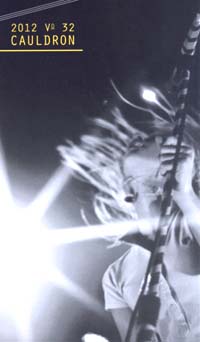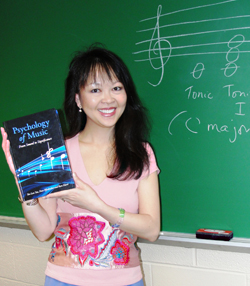Marian Heller ’84 is involved with an art project called “Kokopelli Rising,” part of the Burning Man annual art event that will take place August 27 through September 3 in Black Rock City, Nevada. Marian informed the artists about Katherine Hoover’s flute composition “Kokopelli,” (played by Marian in a live performance). Marian will record the piece for the artists to play on site at the art installation in Nevada. And she will attend as well.
arts
K Art Professor Cited in Exhibition Review
 Sarah Lindley, Art, was one of several featured artists who participated in an exhibition titled “Acts of Recognition.” The exhibition took place at Kendall College, and according to a recent review comprised “an offering of small and heroic acts of grace that perpetuate self-reflection.” The title of Lindley’s piece is “Abandon.” The critic lauded the work, writing that it “captures the simultaneous presence and absence of landmarks that punctuate [the artist’s] daily commute. …By refusing to ground the work, Lindley transports the forms into the realm of the imagined. By doing so, factories once central to the region’s economy become susceptible to memory’s permeability.” The entire review of the show appears in the online publication H.A.C.K.
Sarah Lindley, Art, was one of several featured artists who participated in an exhibition titled “Acts of Recognition.” The exhibition took place at Kendall College, and according to a recent review comprised “an offering of small and heroic acts of grace that perpetuate self-reflection.” The title of Lindley’s piece is “Abandon.” The critic lauded the work, writing that it “captures the simultaneous presence and absence of landmarks that punctuate [the artist’s] daily commute. …By refusing to ground the work, Lindley transports the forms into the realm of the imagined. By doing so, factories once central to the region’s economy become susceptible to memory’s permeability.” The entire review of the show appears in the online publication H.A.C.K.
Smokin’ Poets
Thanks, in part, to Kim Grabowski ’12, the Spring issue of the on-line magazine, The Smoking Poet, features a strong K connection. Grabowski was an intern at the magazine and helped compile an issue that features the work of Writer-in-Residence Diane Seuss ’78 as well as current students and alumni.
The alums include Kit Almy ’89, Lauren Moran ’11, Katie Prout ’09, and John Craig ’11. Current students with poems published in the issue are Nick Canu ’12, Cam Stewart ’12, Rebecca Staudemaier ’12, Kate Belew ’15, and Jasmine An ’15. Maggie Jackson ’11 and Amy Newday had nonfiction published in the magazine. Newday coordinates the College’s Writing Center. And Grabowski’s interview with Michigan poet Laura Kasischke appears as well. Kasischke recently won the Rilke Prize, and she will read works from her new collection, Space, In Chains, on campus this April 16. Chief Editor for The Smoking Poet is Zinta Aistars, who worked for Kalamazoo College for many years.
Goodlander to Perform Traditional Balinese Shadow Puppet Performance
Jennifer Goodlander ’97 will perform a traditional Balinese wayang kulit, or shadow puppet performance, Thursday May 17, 5pm, Dungeon Theatre, Light Fine Arts Building. Admission is free and open to the public.
Wayang kulit is an ancient Indonesian art of shadow puppet theatre that combines ritual, lesson, and entertainment. Goodlander manipulates (and gives voice to) intricately carved and hand-painted puppets, each a unique character with a specific role in a given story.
Many of her puppets were created for her by I Wayang Tunjung, the dalang, or puppet master, in Indonesia with whom she has studied extensively. Goodlander recently joined the faculty at Indiana University as an assistant professor of theatre. During her visit to K, she will meet with students in Professor of Theatre Arts Ed Menta’s Asian Theatre Class.
“Story” Provides Passage to India
Ten Kalamazoo College students who are creating their own theater production this spring with guidance from a guest director from Varanasi, India, will take the show to Varanasi this summer and get a chance to see a country whose culture they have been exploring in class and on stage.
The “Kahani” project — which came about through a unique collaboration of the College’s Theatre Arts Department, Center for International Programs, and Arcus Center for Social Justice Leadership—combines many of the key elements of a K education: rigorous scholarship, critical thinking, international engagement, interdisciplinary exploration, social-justice discussions…and don’t leave out creativity and performance opportunities.
Students are spending just seven weeks devising the scenes for “Kahani” (which means “Story” in Hindi) before they present it May 10-13 at the College’s Nelda Balch Playhouse. And they are required to attend both rehearsals and a class taught by guest director Irfana Majumdar, a visiting fellow of the Arcus Center. In the photo at left, Jane Huffman ’15 (standing), Joe Westerfield ’15 (seated), and Sam Bertken ’12 rehearse for the play. Majumdar assigned readings of a novel and short stories by Indian women writers as jumping-off points for script creation, and many of those pieces explore gender and power dynamics within close relationships.
“Instead of using big issues like communalism, which are also very important in the world, I decided to stay inside smaller, closer human relationships, like within a family,” Majumdar said, “I think it’s very important for men and women to explore these issues of gender together.”
Much of the theater work Majumdar does is “devised work,” meaning it does not begin with a set script. “What is interesting about the project we’re doing, and exciting,” she said, “is…that it’s really a lot about the actors. And since they’re students and they’re just learning to act and beginning their journey of theater, it’s a way to really explore more of themselves and bring that into a project.”
The chance to create a theater piece with fellow students has been exhilarating for senior theater major Sam Bertken, a 22-year-old from northern California.


“I love the possibility for something completely new to be created,” said Bertken when the group was about three weeks into the project. He said the students started off doing exercises to “create a physical vocabulary” and build trust and then focused on their compositional skills. To create potential scenes for the final production, they split into small groups and began voicing their ideas, one right after another.
The process has not been without its challenges, though. “It’s tough,” Bertken said. “Every time you come in you have to be really open to possibilities. The biggest problem is time. There’s this balance of ‘Are we including everybody’s ideas?’ and then ‘Are we being efficient with our time?’”
But they have had a great teacher in Majumdar, he said. “She’s been able to make those of us who’ve never done a devised theater piece feel very confident about our ability to accomplish this project, which is something to be said.”
Back in Varanasi, Majumdar leads a theater studio that’s part of a nongovernmental organization called Nirman, which offers arts-based education for primary and secondary students and study-abroad opportunities for college students. It became one of K’s 43 study-abroad sites in 2010, according to CIP Associate Director Margaret Wiedenhoeft.
The “Kahani” project got started after K religion professor Carol Anderson met Majumdar during a sojourn in India. Majumdar and her mother, Nita, who also helps run the Nirman organization, then visited K about two years ago, and Anderson introduced Professor of Theatre Arts Ed Menta to the women.
“I found out Irfana has a great theater background, and she’s also a filmmaker,” said Menta. “And I thought, ‘Wow, we gotta do something. The stars are lining up right to sort of have a convergence of theater, social justice, and interculturalism. What could be better? It’s like many of the programs and aspirations of the College coming together in one project.’”
Jaime Grant, executive director of the Arcus Center, sees Majumdar as “a perfect visiting fellow” whose work can broaden “theater people’s visions of what theater is for” and “social justice people’s ideas of what’s in their toolbox to create change.”
“If you look at social justice movements throughout the world, theater is often part and parcel of that work,” Grant said. And because the “Kahani” project is a collaborative one in which everyone has a voice, “the process itself speaks to social justice,” Grant added.
The project has been a perfect fit for “Kahani” stage manager Kathleen “Kat” Barrett, a junior majoring both in Theater Arts and in Human Development and Social Relations, a course of study that combines anthropology, sociology and psychology. She said she wanted a college experience that would boost her critical-thinking skills and challenge her thinking about the world. She also likes to keep really busy.
“I’m in various rehearsals from six to midnight most nights,” Barrett said, “but I love what I’m doing. And this production is such an amazing project that the faculty has put together for us.”
“Kahani” will take the stage at Nirman in July as the students travel to India for about 10 days, accompanied by Majumdar, Grant, Menta, and Professor of Theatre Arts Lanny Potts. For Barrett, the journey will be a return trip. She spent July through December studying at Nirman and then a few more weeks traveling through India.
“I’m really excited to go back,” said the 21-year-old, who grew up in the small northern Michigan town of Shelby. “I loved India. I loved the city (of Varanasi). It’s not Delhi. It’s not modernized in a lot of ways. But it has so much character. It’s one of the most religious locations in India because it’s right on the holy Ganges River. It has so many stories and so many people and so much culture.”
Barrett, like so many others at Kalamazoo College, is also thrilled about this opportunity for her fellow students. “I’m so excited that they put in so much work, so much critical energy and then they get to go to India and not only perform it but see the world they’ve been thinking about so much.”
That, too, will surely be an education.
“The Cauldron” Unveiled
 By Elaine Ezekiel ’13
By Elaine Ezekiel ’13
“Sight and Voice Revealed: Unveiling the Cauldron,” was the theme of the Week 6 (May 4) Community Reflection in Stetson Chapel. With support from the Student Activities Fee, each member of the audience received a free copy of the 32nd edition of the literary magazine, which features art, photography, and writing created by K students.
Editors Cam Stewart ’12 and Rebecca Staudenmaier ’12 discussed the Cauldron’s ability to unite students across interests and talents:
“We are the community bound at the book’s spine,” said Staudenmaier.
Writer-in-Residence Diane “Di” Seuss presented the Stephanie Vibbert Award to Erin Donevan ’12. This accolade memorializes the English/psychology double-major from Class of 2003 who died during her senior year at K. The award honors a current student whose writing exemplifies the intersection between creative writing and community engagement. Seuss said that Vibbert would have endorsed Donevan’s work promoting creative writing in Botswana and Kalamazoo.
The College’s Writing Center Director Amy Newday announced the three winners of the Divine Crow Award, which is bestowed on writers of outstanding Cauldron entries. Newday said the winners “wove connections for me through time, space and experience.” They were Paul Lovaas ’13 (for his nonfiction short story “Darkrooms”), Fran Hoepfner ’13 (for her poem “to shatter when dropped”), and Kelly Bush ’12 (for her fantasy short story “Ariadne”). Each student read excerpts from their winning work.
Divine Crow Award runners-up were Umang Varma ’14, Carolyn Stordeur ’12 and Nicholas Canu ’12.
Community Reflection offers a unique forum for discussion, worship, performance, and community expression each Friday at 10:50 AM (refreshments at 10:30) in Stetson Chapel. The entire campus community and general public are invited. Week 7 (May 11) Reflection will be “Perspectives from a Global K,” in which members of the International Student Organization share their experiences and reflections about current global issues
Tan Earns Lucasse Lectureship

By Rachel Leider ’15
Siu-Lan Tan, associate professor of psychology, has earned Kalamazoo College’s highest annual honor for classroom teaching, the Florence J. Lucasse Lectureship for Excellence in Teaching.
The “Lucasse,” was established in 1979 in honor of Florence J. Lucasse, Class of 1910, in response to the major unrestricted endowment gift she bequeathed to the College in her will. In addition to the Lectureship, a Florence J. Lucasse Fellowship for Excellence in Scholarship is also awarded. Andrew Mozina, associate professor of English, holds the current Lucasse Fellowship.
Tan was taken aback by her award: “I think the world of my colleagues and students, and knowing that they nominated and supported me for this was overwhelming. I immediately teared up, as I felt it deeply.”
President Eileen Wilson-Oyelaran expressed her admiration for Tan as she presented the award during the fall quarter all-campus gathering in Dalton Theatre on Sept. 20. “Professor Tan often extends students’ experiences beyond the classroom, and these service-learning experiences transform their learning, making concepts that may have once seemed dissonant in class become consonant in practice.”
Born in Indonesia, Tan grew up in Hong Kong where she taught music. After moving to California, she earned a B.A. degree in music at Pacific Union College and taught music for several years. Later, she became interested in psychology and earned both Master’s and Ph.D. degrees in psychology at Georgetown University.
Teaching at Kalamazoo College since 1998, Tan offers courses in developmental psychology, creativity, and the psychology of music. In 2010, she co-authored the textbook The Psychology of Music: From Sound to Significance.
Per Lucasse tradition, Tan will speak to students, faculty, staff, and quests about her work at a spring 2012 lecture.
Congratulations, Dr. Tan!
Writer-in-Residence Diane Seuss Receives Accolades for Outstanding Poetry
Kalamazoo College’s Writer-in-Residence Diane Seuss ’78 continues to receive accolades for her outstanding work in the world of poetry. A sample of a few recent honors follow–honors that help put Kalamazoo College, on Di’s coattails, on the literary map!
First, she will be teaching the “Advanced Seminar,” with poets Patrick Donnelly and Reginald Dwayne Betts, at the Frost Place this summer, located at Robert Frost’s homestead in Franconia, New Hampshire. In the fall, she has been invited to be the McLean Distinguished Visiting Writer at Colorado College. That position has been held by many distinguished writers, including Ghanaian poet and cultural activist Kofi Anyidoho, feminist film theorist Tania Modelski, Canadian novelist Nino Ricci, and Irish poet Eamon Grennan.
At Colorado College, Di will be teaching the Advanced Seminar in Poetry. In addition, Di was named the winner of the Summer Literary Seminars contest in poetry because of three of her poems, which will appear in Black Warrior Review later in the year. The contest winner also receives airfare, tuition, and housing for one of the Summer Literary Seminars in Lithuania or Kenya. Di will go to Kenya. And, most recently, Di learned that her poem “Either everything is sexual, or nothing is. Take this flock of poppies,” has been selected for reprint in Pushcart Prize XXXVII: Best of the Small Presses. The Pushcart Prize honors the best poetry, short fiction, and short nonfiction published in literary magazines in the previous year.
Congratulations, Di!
The Binary Strip
 When it comes to the Senior Individualized Project, sculptor Daedalian Derks ’12 thinks BIG—as in the kind of installation measured by “chain” (a forestry metric of 66 and one-half feet), as in a three-dimensional sculpture stronger than the urge to procreate. No kidding!
When it comes to the Senior Individualized Project, sculptor Daedalian Derks ’12 thinks BIG—as in the kind of installation measured by “chain” (a forestry metric of 66 and one-half feet), as in a three-dimensional sculpture stronger than the urge to procreate. No kidding!
“The Binary Strip,” the fourth and largest sculpture in Derks’ SIP quartet (the other works are called “The Purple Pieces,” “Primary Shapes Weather Vane,” and “Fractal Reflections”), was installed for one week only at the Lillian Anderson Arboretum “Magnificent Pines” trail (see photo). Any longer and it might have affected spring mating rituals of local fauna (who says art’s not stronger than sex?). The piece includes 228 freely spinning black-and-white square panels made from aluminum roofing flashing and grouped into sections of eight, like the binary language in computer science. Conceived at first as a way to “see the wind,” the project evolved into a deeper exploration of the way art interacts with a specific natural setting.
Said Derks (an art-major- classics-minor convert from a history-and-art double major from, originally, a biology major): “I wanted to install it as a flat plane, but the swaying of the pines would have destroyed anything other than a catenary,” a long architectural curve that, in the case of “The Binary Strip,” changes its arc as the trees move. What an interesting way to learn architecture from the natural world! (Derks one day hopes to do graduate work in a program that combines art, culture, technology, and architecture.)
Still, for many, one week was too short to see the piece. If you missed it at the Arb, you can see it at the Light Fine Arts Building on Thursday, April 26, at 4 P.M. when Derks will share his entire SIP sculpture project during an artist presentation open to the public.
Voice Performance Students Place in Regional Audition
Three of Professor of Music Jim Turner’s voice students placed in the 2012 Great Lakes Regional National Association of Teachers of Singing auditions, which were held in early March at Grand Valley State University.
Hannah Shaughnessey-Mogil ’14 was awarded an Honorable Mention for First Year Women. Jenna Hunt ’’13 took third place in Junior Women. And Erin Donevan ’12 placed first in Musical Theatre.

